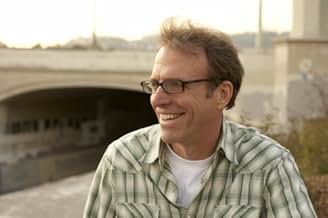IMDb रेटिंग
7.4/10
29 हज़ार
आपकी रेटिंग
अपनी भाषा में प्लॉट जोड़ेंKirby Dick's exposé about the American movie ratings board.Kirby Dick's exposé about the American movie ratings board.Kirby Dick's exposé about the American movie ratings board.
- निर्देशक
- लेखक
- स्टार
- पुरस्कार
- 4 जीत और कुल 3 नामांकन
Clark Baker
- Self - Private Investigator
- (as Clark)
फ़ीचर्ड समीक्षाएं
A look into the mysterious organization that decides what rating a film is given. And all sorts of other issues/arguments that are created because of it. Numerous actors, directors, producers, former MPAA raters and critics share their thoughts on the good and bad of the highly secretive organization.
I have always found "rating reasons" funny and often absurd, which is why I make my own when writing these things. I have also always liked to look into second opinion on things so maybe whoever reads my little IMDb reviews will get that from them. Since, the often disturbing fact for film makers is the rating is something they have to live with and discussing it with the people who decided it is virtually not an option. And that ultimately decides what theaters decided to show it and how much, which is essentially how films money.
The reason as many of you know for the infamous NC-17 rating is sexual content, especially if it is explicit, and that is basically the focus of this film. Which is both good and bad. Good, because they do a pretty good job comparing R-rated and NC-17 rated sex scenes which are not that different. But bad, because the issue of violence (in my opinion the most potentially objectionable thing shown in film) is attended to on a small scale. There are violent PG-13 movies (Ah-nuld's "The 6th Day" for one) which include bone breaking, dismemberment, and you get the picture. While on the other side you have R-rated movies with really minimal or much more accurate depiction of violence (Michael Mann's "Heat" for one). Yet violence as entertainment is condoned, but showing kids what violence really looks like is not. Darren Aronofsky and Kevin Smith make the film's only points on violence and it'll leave you wanting for more.
Also there wasn't a comparison to other countries rating system, just a mention that those systems are a little less absurd, which is true if you look at the rating sections on most IMDb film profiles, but some thought here would have been invaluable to this film's argument.
However, this remains a pleasantly fresh documentary that many, but mainly John Waters (haha), have been waiting for. 8/10
Not Rated, contains: sexual material and some violent clips - There are many clips of sex scenes shown, but are shown and discussed from a critical perspective. The few violent scenes are discussed in the same manner. So bring your kids! They'll finally know what "it's not for you" means.
I have always found "rating reasons" funny and often absurd, which is why I make my own when writing these things. I have also always liked to look into second opinion on things so maybe whoever reads my little IMDb reviews will get that from them. Since, the often disturbing fact for film makers is the rating is something they have to live with and discussing it with the people who decided it is virtually not an option. And that ultimately decides what theaters decided to show it and how much, which is essentially how films money.
The reason as many of you know for the infamous NC-17 rating is sexual content, especially if it is explicit, and that is basically the focus of this film. Which is both good and bad. Good, because they do a pretty good job comparing R-rated and NC-17 rated sex scenes which are not that different. But bad, because the issue of violence (in my opinion the most potentially objectionable thing shown in film) is attended to on a small scale. There are violent PG-13 movies (Ah-nuld's "The 6th Day" for one) which include bone breaking, dismemberment, and you get the picture. While on the other side you have R-rated movies with really minimal or much more accurate depiction of violence (Michael Mann's "Heat" for one). Yet violence as entertainment is condoned, but showing kids what violence really looks like is not. Darren Aronofsky and Kevin Smith make the film's only points on violence and it'll leave you wanting for more.
Also there wasn't a comparison to other countries rating system, just a mention that those systems are a little less absurd, which is true if you look at the rating sections on most IMDb film profiles, but some thought here would have been invaluable to this film's argument.
However, this remains a pleasantly fresh documentary that many, but mainly John Waters (haha), have been waiting for. 8/10
Not Rated, contains: sexual material and some violent clips - There are many clips of sex scenes shown, but are shown and discussed from a critical perspective. The few violent scenes are discussed in the same manner. So bring your kids! They'll finally know what "it's not for you" means.
The film rating system in this country is governed by a secret panel created by the major film studios more than 35 years ago. Since its inception the MPAA ratings board has functioned as a sort of 'black box' where movies go in one end and a rating comes out the other, with absolutely no transparency or public accountability of the process.
The MPAA rating system is publicly proclaimed to be merely a voluntary industry system that nobody is 'required' to follow. Unfortunately the reality of the movie industry is entirely divorced from these innocuous proclamations. The rating placed on a film largely determines who gets to see it in a theater, and what sort of publicity for the movie will be accepted by television and newspapers. An NC-17 basically guarantees that only the small sliver of the public with access to art house cinemas will ever sit down in a theater to watch the film, and that there will be virtually no way to promote the film to the public.
So, in the real world, the MPAA ratings board wields considerable unchecked power over the film industry. Since the organization is funded and sustained by the major studios, that influence becomes particularly problematic when applied to independent productions. It would be not unlike a small, local merchant having to go to board set up by Wal-Mart and Target to get approval for what he can put out on his shelves.
Kirby Dick approaches this subject with humor, insight, and tenacity. He undertakes to blow the lid off of the black box of the MPAA rating system. In the process he creates a narrative filled with both information and humor. While I will leave his methods as a surprise for the viewer, suffice it say they are both unconventional and effective.
The interspersing of interviews with independent filmmakers who have been forced to do battle with the MPAA to get their movies seen, provides an excellent counterpoint to Dick's quest to expose the star chamber like proceedings of the rating board to the light of day. As well, his side-by-side comparisons of similar films, one receiving an R rating and the other an NC-17, is illustrative of the particular biases present on the ratings board.
If you care deeply about he art of film, This Film Is Not Yet Rated is a must-see. On the other hand if you just want to learn a little something and have a good laugh, this is a good pick for you too.
The MPAA rating system is publicly proclaimed to be merely a voluntary industry system that nobody is 'required' to follow. Unfortunately the reality of the movie industry is entirely divorced from these innocuous proclamations. The rating placed on a film largely determines who gets to see it in a theater, and what sort of publicity for the movie will be accepted by television and newspapers. An NC-17 basically guarantees that only the small sliver of the public with access to art house cinemas will ever sit down in a theater to watch the film, and that there will be virtually no way to promote the film to the public.
So, in the real world, the MPAA ratings board wields considerable unchecked power over the film industry. Since the organization is funded and sustained by the major studios, that influence becomes particularly problematic when applied to independent productions. It would be not unlike a small, local merchant having to go to board set up by Wal-Mart and Target to get approval for what he can put out on his shelves.
Kirby Dick approaches this subject with humor, insight, and tenacity. He undertakes to blow the lid off of the black box of the MPAA rating system. In the process he creates a narrative filled with both information and humor. While I will leave his methods as a surprise for the viewer, suffice it say they are both unconventional and effective.
The interspersing of interviews with independent filmmakers who have been forced to do battle with the MPAA to get their movies seen, provides an excellent counterpoint to Dick's quest to expose the star chamber like proceedings of the rating board to the light of day. As well, his side-by-side comparisons of similar films, one receiving an R rating and the other an NC-17, is illustrative of the particular biases present on the ratings board.
If you care deeply about he art of film, This Film Is Not Yet Rated is a must-see. On the other hand if you just want to learn a little something and have a good laugh, this is a good pick for you too.
Kirby Dick's expose of the MPAA's ratings process only confirms the suspicion that motion picture ratings are virtually worthless, arbitrarily assigned by an elite panel who purport to have our country's children's best interests at heart, but who seem to think that an exposed breast is more harmful to them than seeing a gunshot to the head.
It's absolutely infuriating that the country's churches have a seat on the ratings boards and a say in what content is or is not suitable for consumption. It's infuriating that an NC-17 rating exists at all (the board is essentially usurping the judgement and decision-making abilities of parents), but doubly infuriating that it's used as a punishment to "encourage" filmmakers to alter their films so that they're more palatable for mainstream film goers. For a while I was kind of sad that home video and the Internet seems to be supplanting movie theatres as the preferred venue for watching films, but now I appreciate the democratizing effect of companies like Netflix and Blockbuster, who have made great filmmakers less reliant on corporate theatre chains to get their films distributed and seen.
As a documentary, "This Film Is Not Yet Rated" is rather disorganized. Dick has good points to make, but their impact is blunted by tangents and off-topic tirades. Dick hires a private detective to track down the identities of the ratings board, and spends far too much of his 96 minutes following the details of that investigation. On the plus side, it's great to see directors and actors like Kimberly Peirce, Maria Bello and John Waters given a venue to vent their frustrations at the ratings practice.
One of the main points Dick makes, and one I heartily agree with, is that the ratings board focuses far more energy on censoring sex in films than they do violence, a point that is unintentionally driven home by none other than the ratings board chairman herself towards the film's climax. Dick asks why his documentary received an NC-17 rating and she cites the sexual content that appears in some of the clips of films that have received NC-17 ratings sprinkled throughout the documentary. She seems to have no problem with some of the very violent content included in clips from some of those very same movies. What an idiot.
Grade: B+
It's absolutely infuriating that the country's churches have a seat on the ratings boards and a say in what content is or is not suitable for consumption. It's infuriating that an NC-17 rating exists at all (the board is essentially usurping the judgement and decision-making abilities of parents), but doubly infuriating that it's used as a punishment to "encourage" filmmakers to alter their films so that they're more palatable for mainstream film goers. For a while I was kind of sad that home video and the Internet seems to be supplanting movie theatres as the preferred venue for watching films, but now I appreciate the democratizing effect of companies like Netflix and Blockbuster, who have made great filmmakers less reliant on corporate theatre chains to get their films distributed and seen.
As a documentary, "This Film Is Not Yet Rated" is rather disorganized. Dick has good points to make, but their impact is blunted by tangents and off-topic tirades. Dick hires a private detective to track down the identities of the ratings board, and spends far too much of his 96 minutes following the details of that investigation. On the plus side, it's great to see directors and actors like Kimberly Peirce, Maria Bello and John Waters given a venue to vent their frustrations at the ratings practice.
One of the main points Dick makes, and one I heartily agree with, is that the ratings board focuses far more energy on censoring sex in films than they do violence, a point that is unintentionally driven home by none other than the ratings board chairman herself towards the film's climax. Dick asks why his documentary received an NC-17 rating and she cites the sexual content that appears in some of the clips of films that have received NC-17 ratings sprinkled throughout the documentary. She seems to have no problem with some of the very violent content included in clips from some of those very same movies. What an idiot.
Grade: B+
This movie is informative, but also funny and clever and kind of mind-blowing. It's not for the faint of heart because it contains quite a bit of graphic footage to illustrate the point that the ratings board is totally arbitrary (in fact, one former board member says there is absolutely no training or standards -- you come in on your first day and start to rate movies). That may seem not to matter, but it matters quite a bit to the film makers whose films are being rated and several appear in the film and make very strong arguments for why the rating their film received was unfair. There are also interviews with several other people (like a free speech lawyer) who add context to Kirby Dick's expose. This really is a must see for anyone who cares about movies and it's a lot of damn fun too.
Since the Hays Code, filmmakers have had a lot more freedom over the content of their films. However, the MPAA ratings board still does exercise a certain de facto censorship power. Most people do not realize this.
"This Film is not Yet Rated" exposes the arbitrariness, secrecy, and bias of the MPAA ratings board and makes the viewer question why movies receive the ratings they do.
Kirby Dick puts together a nice cross-section of directors and "talking heads" who discuss the MPAA ratings board's biases when it comes to realism, sex, violence, gay themes, and other taboo issues in films.
Dozens of major directors have had problems with the MPAA ratings board - they either received the NC-17 (or the old "X") rating or had to cut their films to meet the requirements of the ratings board. Some examples are: Kubrick, Tarantino, Lynch, Woo, Friedkin, Peckinpah, Aronofsky, and countless others.
This film exposes the fact that the ratings board is made up of people who are given NO criteria and NO training for rating films, so they basically use their own personal (and obviously heavily biased) judgments to decide what rating a particular movie should receive.
This is an important film because so few people realize how movies are rated in the U.S. Even fewer realize how problematic (biased, anti-democratic, non-transparent, not accountable) our system is.
It is also well put together, so it is easier to watch than most documentaries.
I would have liked to have heard more comparisons between the U.S. rating system and others worldwide, something that was only briefly touched upon.
9 out of 10
"This Film is not Yet Rated" exposes the arbitrariness, secrecy, and bias of the MPAA ratings board and makes the viewer question why movies receive the ratings they do.
Kirby Dick puts together a nice cross-section of directors and "talking heads" who discuss the MPAA ratings board's biases when it comes to realism, sex, violence, gay themes, and other taboo issues in films.
Dozens of major directors have had problems with the MPAA ratings board - they either received the NC-17 (or the old "X") rating or had to cut their films to meet the requirements of the ratings board. Some examples are: Kubrick, Tarantino, Lynch, Woo, Friedkin, Peckinpah, Aronofsky, and countless others.
This film exposes the fact that the ratings board is made up of people who are given NO criteria and NO training for rating films, so they basically use their own personal (and obviously heavily biased) judgments to decide what rating a particular movie should receive.
This is an important film because so few people realize how movies are rated in the U.S. Even fewer realize how problematic (biased, anti-democratic, non-transparent, not accountable) our system is.
It is also well put together, so it is easier to watch than most documentaries.
I would have liked to have heard more comparisons between the U.S. rating system and others worldwide, something that was only briefly touched upon.
9 out of 10
क्या आपको पता है
- ट्रिवियाThe MPAA announced that starting in March of 2007, it will change their policy and allow filmmakers to cite other film's ratings as comparison. The MPAA will also provide information about the demographics of its board.
- भाव
John Waters: I also heard on 'A Dirty Shame' - and I have no proof of this - that there were doctors involved... and that some of the kinkier terms, like felching and stuff, that they explained to the MPAA what felching meant. Now, I would like to have heard that because felching, no one has ever done felching. Felching is when you fuck someone and suck your own cum out of their asshole. Well, I know a lot of perverts and I don't know anyone who's done that.
- क्रेज़ी क्रेडिटAt the end credits a count of what the film shows: FUCKS(OR DERIVATIONS OF): 20 MOTHERFUCKERS: 3 HUMPS: 220 NIPPLES: 10 INTERCOURSE WITH PIE: 1 CARTOONS/PUPPETS IN SEXUAL POSITIONS: 15 SPLOSHING: 1 FELCHING: 0
- कनेक्शनEdited into This Film Is Not Yet Rated: Deleted Scenes (2009)
- साउंडट्रैकAppeals Members
Written and Performed by Michael S. Patterson (ASCAP)
Courtesy of Absynthe Zelery Music (ASCAP)
टॉप पसंद
रेटिंग देने के लिए साइन-इन करें और वैयक्तिकृत सुझावों के लिए वॉचलिस्ट करें
- How long is This Film Is Not Yet Rated?Alexa द्वारा संचालित
विवरण
- रिलीज़ की तारीख़
- कंट्री ऑफ़ ओरिजिन
- भाषा
- इस रूप में भी जाना जाता है
- Los censores de Hollywood
- फ़िल्माने की जगहें
- उत्पादन कंपनियां
- IMDbPro पर और कंपनी क्रेडिट देखें
बॉक्स ऑफ़िस
- US और कनाडा में सकल
- $3,06,845
- US और कनाडा में पहले सप्ताह में कुल कमाई
- $30,664
- 3 सित॰ 2006
- दुनिया भर में सकल
- $3,47,240
- चलने की अवधि
- 1 घं 38 मि(98 min)
- रंग
- ध्वनि मिश्रण
- पक्ष अनुपात
- 1.85 : 1
इस पेज में योगदान दें
किसी बदलाव का सुझाव दें या अनुपलब्ध कॉन्टेंट जोड़ें































